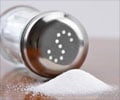Kellogg is all set the salt content in its most popular cereals, including Corn Flakes, Rice Krispies, Coca Pops, Ricicles, Frosties and Crunchy Nut.
Kellogg is all set the salt content in its most popular cereals, including Corn Flakes, Rice Krispies, Coca Pops, Ricicles, Frosties and Crunchy Nut.
The move follows sustained pressure from the British Government's Food Standards Agency and other campaigning health groups.The FSA has been warning the nation is eating too much salt, calculating the average daily salt consumption is 8.6g, which is 43% above the recommended limit of 6g.
The figure is linked to 14,200 premature deaths a year from conditions linked to high blood pressure, including strokes and heart attacks.
The food giant is reducing the amount of salt in its Rice Krispies and Corn Flakes by 30%, while levels in its Coco Pops and Ricicles will drop 33%. From March, Kellogg's Frosties and Crunchy Nut recipes will contain 23% less salt.
Alyson Greenhalgh-Ball, head of nutrition at Kellogg, said: "For the past 12 years we've been listening to our shoppers and taken down the amount of salt in our food.
"We've been doing this slowly. We take people's palates with us and so they don't notice any difference in taste. Since 1998 we've taken over 45% of salt out of our cereals."
Advertisement
No salt replacers are being used.
Advertisement
The company forecasts the move will decrease Britain's annual salt intake by approximately 300 tonnes.
Professor Graham MacGregor, chairman of Consensus Action on Salt and Health, said: “We are thrilled that Kellogg's have finally acknowledged that people don't want salty breakfast cereals.
“However, even with the new reductions, Kellogg's breakfast cereals will still have more salt than many others available in the supermarkets, so they still have some work to do.”
The World Action on Salt and Health (WASH) was launched in October 2006 in an attempt to campaign for reduced salt intake to less than 5g per day. The UK has been seen as leaders with many manufacturers and retailers cutting back on the salt content in their products in the wake of a campaign by the Food Standards Agency.
AWASH (hosted by the George Institute) revealed that one single sausage sandwich at your local barbecue could contain as much as 6 grams of salt; 100 per cent of the maximum daily recommended amount for adults and almost double that recommended for children.
In a recent paper published in the New England Journal of Medicine, US researchers said that a national effort to reduce daily salt intake by 3 g (1200 mg of sodium) could bring down the annual number of new cases of coronary heart disease (CHD) by 60,000 to 120,000, stroke by 32,000 to 66,000, and myocardial infarction by 54,000 to 99,000 and reduce the annual number of deaths from any cause by 44,000 to 92,000. This intervention could also save 194,000 to 392,000 quality-adjusted life-years and $10 billion to $24 billion in health care costs annually, it was said.
Source-Medindia
GPL









